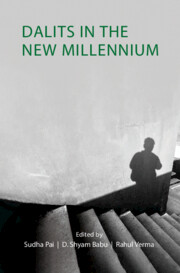Book contents
- Frontmatter
- Contents
- List of Figures
- List of Tables
- Acknowledgements
- 1 Introduction: Dalit Discourse in the New Millennium
- Part I Shifting Patterns of Electoral Politics
- 2 Voting Patterns among Dalits since the 1990s
- 3 On the Peculiar Absence of Dalit Politics: Punjab and West Bengal
- 4 Decline of the Bahujan Samaj Party: Dalit Politics under Right-Wing Hegemony
- 5 A Democratic Dilemma: Dalit Parties, Campaign Finance, and Coalition Politics
- 6 Why Are More Dalits Voting for the Bharatiya Janata Party since 2014?
- Part II Popular Culture, Discourse, and Protest
- Part III Transformations in Ideology and Identity
- Part IV Aspirations and Anxieties
- Part V Discrimination and Representation
- About the Contributors
- Index
5 - A Democratic Dilemma: Dalit Parties, Campaign Finance, and Coalition Politics
from Part I - Shifting Patterns of Electoral Politics
Published online by Cambridge University Press: 12 July 2023
- Frontmatter
- Contents
- List of Figures
- List of Tables
- Acknowledgements
- 1 Introduction: Dalit Discourse in the New Millennium
- Part I Shifting Patterns of Electoral Politics
- 2 Voting Patterns among Dalits since the 1990s
- 3 On the Peculiar Absence of Dalit Politics: Punjab and West Bengal
- 4 Decline of the Bahujan Samaj Party: Dalit Politics under Right-Wing Hegemony
- 5 A Democratic Dilemma: Dalit Parties, Campaign Finance, and Coalition Politics
- 6 Why Are More Dalits Voting for the Bharatiya Janata Party since 2014?
- Part II Popular Culture, Discourse, and Protest
- Part III Transformations in Ideology and Identity
- Part IV Aspirations and Anxieties
- Part V Discrimination and Representation
- About the Contributors
- Index
Summary
In recent decades, India has experienced what numerous analysts christened a ‘democratic revolution’, referring to the surge in electoral participation among socially underrepresented groups (Yadav, 2002). This broadening social profile of democratic practice has, in turn, spurred the creation of new political parties representing historically disadvantaged communities (Hasan, 2002; Chhibber, 2001). In a study of how these developments altered the demographics of state legislatures and the national parliament, Christophe Jaffrelot (2003) proclaimed a ‘silent revolution’, referring to a mostly non-violent transfer of power whereby ‘plebeians’ gradually dislodged a once entrenched political elite from elected office. While these scholars documented how traditional caste and class barriers to elected representation had begun to yield to a wide range of new actors, their findings pertained foremost to intermediate caste groups, traditional non-elites that converted their numerical preponderance and rising economic status into electoral clout. Such accounts are not representative of the experience of most Dalit-led parties, which have typically foundered in the electoral arena.
Penned on the heels of this great churning in Indian democracy, some early works overstated the ameliorative effects of formal democratic integration for marginalized groups and underestimated the systemic hurdles they would face upon entering elections. While ample ink has been spilled on this transition into democratic politics and the changing social profile of elected representatives, noticeably less scrutiny has considered its afterlife. This raises important questions that warrant further examination: how do recently launched Dalit parties navigate the complex landscape of democratic politics?3 What obstacles do they encounter in mobilizing resources, organizing campaigns, and promoting minority interests? And, importantly, how do these challenges reconfigure the character of Dalit representation? Combining ethnography and interviews, this chapter investigates democratic integration in retrospect, drawing on the experiences and perspectives of first-generation Dalit politicians who steered a radical social movement into electoral politics more than two decades earlier.
To explore these questions, the chapter presents field research conducted with members of the Viduthalai Chiruthaigal Katchi (VCK; Liberation Panthers Party), which is among the most prominent Dalit parties in India today. Established in Madurai, Tamil Nadu, in 1982, as a state-unit of the Dalit Panthers of India, the movement borrowed its name and early inspiration from the Black Panthers of America (Collins, 2017).
- Type
- Chapter
- Information
- Dalits in the New Millennium , pp. 78 - 94Publisher: Cambridge University PressPrint publication year: 2023



